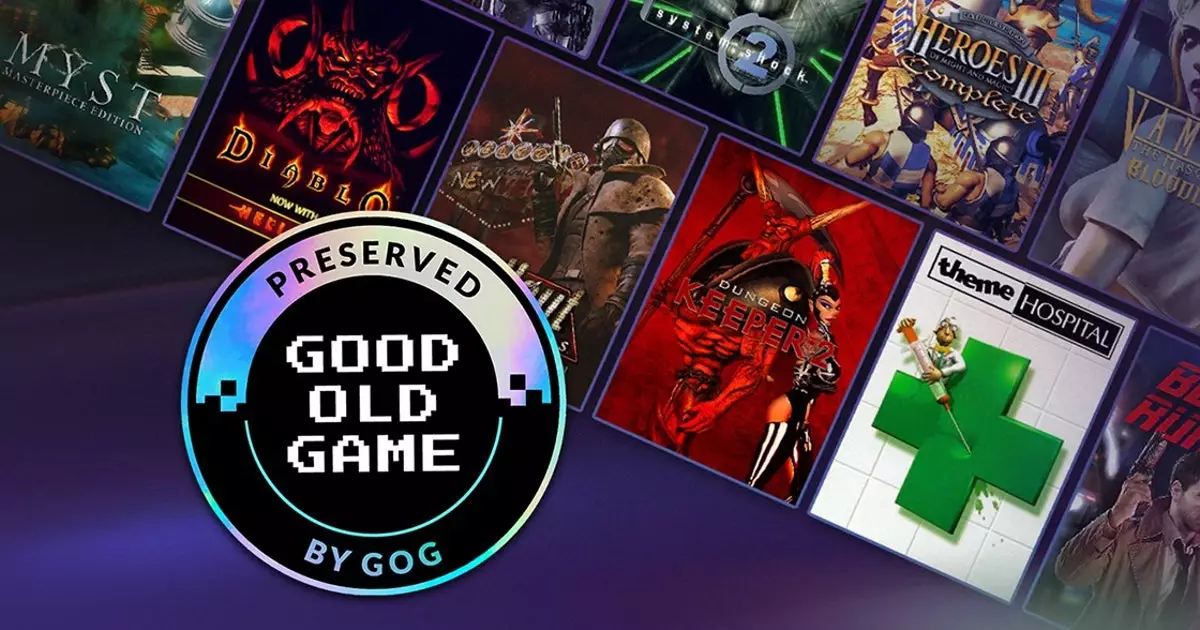As the gaming industry continues to evolve, there remains a palpable nostalgia for classic games that defined eras and shaped the landscape of interactive entertainment. GOG (Good Old Games) has carved out a niche for itself as a champion of classic titles, allowing players to revisit the games that once captivated their imaginations. However, in recent years, GOG has expanded its offerings to include modern blockbusters, raising questions about its commitment to game preservation. Recently, GOG unveiled a renewed focus with its Preservation Program, a significant initiative aimed at restoring classic games to ensure they remain accessible on contemporary hardware.
Historically, GOG was celebrated for its extensive library of older games, providing players with access to titles that had long faded from mainstream visibility. But in an intriguing twist, GOG’s catalog has increasingly featured a variety of modern games, reminiscent of a slightly older, DRM-free version of Steam. This transition might appear to compromise GOG’s dedication to preserving gaming history, yet the introduction of the Preservation Program highlights a genuine effort to restore older titles and make them playable for a new generation.
The program is a concrete step toward reaffirming GOG’s identity as a curator of gaming history while also engaging with modern players. It aims to tackle the challenges that often impede older games from functioning on modern systems, thus bridging the gap between nostalgia and contemporary gaming experiences.
The Mechanics of the Preservation Program
At its core, the GOG Preservation Program operates through the meticulous overhaul of classic games to enhance their compatibility with today’s gaming hardware. The initiative draws inspiration from Valve’s Steam Deck Verified system, which serves as a benchmark for gauging the performance of games on newer platforms. By incorporating modern features, such as updated video codecs and compatibility with Windows 10/11, GOG aims to eliminate common bugs that can detract from player experience.
Games that undergo this comprehensive restoration process earn the esteemed “Good Old Game” badge, signifying their readiness for seamless play without the usual frustrations of unofficial patches or mods. Furthermore, such titles will be marketed as the “most complete version available,” which includes any additional downloadable content (DLC), expansions, manuals, and language options, all while remaining free of digital rights management (DRM).
This initial rollout sees over 100 classic games, such as the original Resident Evil trilogy, Diablo, and System Shock 2, receiving this renewed treatment. The nostalgia for games like Fallout and Vampire: The Masquerade – Bloodlines underscores the excitement surrounding this initiative, as players look forward to reliving these iconic adventures with modern enhancements.
While the Preservation Program reflects GOG’s noble intention to preserve gaming history, the reality is that commercial viability plays a significant role in its execution. The program relies on agreements with original developers and publishers to access source code, a process that can be fraught with hurdles. Some developers may be hesitant to allow access, while others might prioritize profit over nostalgia.
Despite these challenges, the necessity of a profitable business model cannot be overstated. GOG’s commitment to showcasing classic titles while ensuring the company’s sustainability is a delicate balancing act. The gaming community has recently voiced concerns over the destruction of unplayable titles due to server shutdowns, making GOG’s preservation efforts even more pertinent in today’s digital landscape.
GOG’s Preservation Program is a timely response to the growing concerns surrounding digital game preservation. As gaming continues to evolve, the intersection of nostalgia and modern gaming technology will be crucial. GOG’s commitment to improving accessibility and ensuring that classic titles survive the test of time is laudable. Ultimately, if GOG continues this path and navigates the complexities of rights and permissions, it could solidify its position as a key player in the preservation of gaming heritage.
In a world where the gaming industry often prioritizes profits over preservation, GOG’s initiative is a breath of fresh air. By re-embracing its roots and facilitating these restorations, GOG is not just reviving classic games; it’s ensuring that the legacy of these titles endures for generations to come.


Leave a Reply